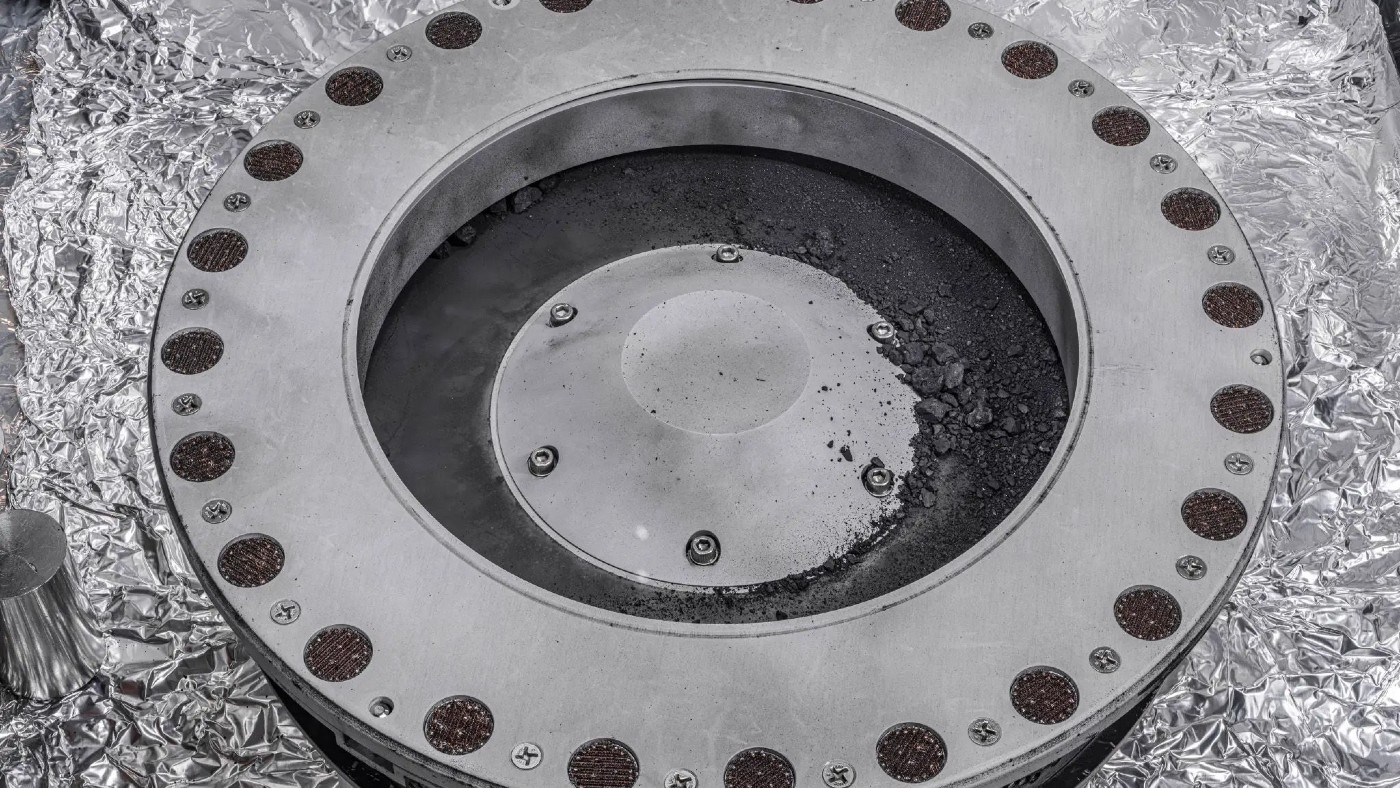Nasa reveals first findings from asteroid that could explain origins of life
Sample from Bennu has been found to contain an abundance of water and carbon

A free daily email with the biggest news stories of the day – and the best features from TheWeek.com
You are now subscribed
Your newsletter sign-up was successful
A sample from the near-Earth asteroid Bennu has been found to contain an abundance of water and carbon, reinforcing the theory that life on Earth was seeded from outer space.
Just two weeks after the sample was parachuted into the Utah desert, a small quantity of the material was unveiled by Nasa at the Johnson Space Center in Houston. "This is the biggest carbon-rich asteroid sample ever returned to Earth," Nasa administrator Bill Nelson said.
The asteroid material "included waterlogged clay minerals", said The New York Times. This "could help solve how Earth became a water planet" as asteroids similar to Bennu "may have crashed into Earth, filling our oceans". The sample also contained sulphur, a crucial element for many geological transformations in rocks.
The Week
Escape your echo chamber. Get the facts behind the news, plus analysis from multiple perspectives.

Sign up for The Week's Free Newsletters
From our morning news briefing to a weekly Good News Newsletter, get the best of The Week delivered directly to your inbox.
From our morning news briefing to a weekly Good News Newsletter, get the best of The Week delivered directly to your inbox.
Like other asteroids, Bennu "is a relic of the early solar system", said Al Jazeera. Because its present-day chemistry and mineralogy are "virtually unchanged since its formation", it could prove central to studies of astrobiology.
Nasa's unmanned Osiris-Rex spacecraft launched from Florida in 2016 and reached Bennu just over two years later. It made a brief, five-second contact with the asteroid in October 2020, gathering the material, which it then sent back to Earth via its sample capsule.
Nasa will now distribute parts of the Bennu sample to researchers around the world, who will study it in great detail. Their work will determine, among other things, "the identity of the carbon compounds, which could shed light on how life got started here on Earth", said Space.com.
"The bounty of carbon-rich material and the abundant presence of water-bearing clay minerals are just the tip of the cosmic iceberg," said Dante Lauretta, the principal investigator of the mission at the University of Arizona.
A free daily email with the biggest news stories of the day – and the best features from TheWeek.com
"With each revelation from Bennu, we draw closer to unraveling the mysteries of our cosmic heritage."
Jamie Timson is the UK news editor, curating The Week UK's daily morning newsletter and setting the agenda for the day's news output. He was first a member of the team from 2015 to 2019, progressing from intern to senior staff writer, and then rejoined in September 2022. As a founding panellist on “The Week Unwrapped” podcast, he has discussed politics, foreign affairs and conspiracy theories, sometimes separately, sometimes all at once. In between working at The Week, Jamie was a senior press officer at the Department for Transport, with a penchant for crisis communications, working on Brexit, the response to Covid-19 and HS2, among others.
-
 Political cartoons for February 20
Political cartoons for February 20Cartoons Friday’s political cartoons include just the ice, winter games, and more
-
 Sepsis ‘breakthrough’: the world’s first targeted treatment?
Sepsis ‘breakthrough’: the world’s first targeted treatment?The Explainer New drug could reverse effects of sepsis, rather than trying to treat infection with antibiotics
-
 James Van Der Beek obituary: fresh-faced Dawson’s Creek star
James Van Der Beek obituary: fresh-faced Dawson’s Creek starIn The Spotlight Van Der Beek fronted one of the most successful teen dramas of the 90s – but his Dawson fame proved a double-edged sword
-
 Data centers could soon be orbiting in space
Data centers could soon be orbiting in spaceUnder the radar The AI revolution is going cosmic
-
 Australia’s teen social media ban takes effect
Australia’s teen social media ban takes effectSpeed Read Kids under age 16 are now barred from platforms including YouTube, TikTok, Instagram, Facebook, Snapchat and Reddit
-
 Google avoids the worst in antitrust ruling
Google avoids the worst in antitrust rulingSpeed Read A federal judge rejected the government's request to break up Google
-
 Supreme Court allows social media age check law
Supreme Court allows social media age check lawSpeed Read The court refused to intervene in a decision that affirmed a Mississippi law requiring social media users to verify their ages
-
 Nvidia hits $4 trillion milestone
Nvidia hits $4 trillion milestoneSpeed Read The success of the chipmaker has been buoyed by demand for artificial intelligence
-
 X CEO Yaccarino quits after two years
X CEO Yaccarino quits after two yearsSpeed Read Elon Musk hired Linda Yaccarino to run X in 2023
-
 Musk chatbot Grok praises Hitler on X
Musk chatbot Grok praises Hitler on XSpeed Read Grok made antisemitic comments and referred to itself as 'MechaHitler'
-
 Another Starship blast sets back Musk's Mars hopes
Another Starship blast sets back Musk's Mars hopesSpeed Read Nobody was killed in the explosion, which occurred in south Texas